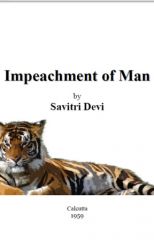
Author : Srimati Savitri Dëvi Mukherji (Maximine Portaz, Maximiani Portas)
Title : Impeachment of Man
Year : 1959
Link download : Savitri_Devi_-_Impeachment_of_Man.zip
Preface. This book — only now printed for the first time — was written in 1945-46, i.e., fourteen years ago. It expresses the views which I have had all my life concerning animals in particular and living nature in general, and my no less life-long protest against their ruthless exploitation by man: an attitude rooted, in both cases, in a pre-eminently aesthetic and life-centered outlook on the world, in complete opposition to that utilitarian and man-centered one, which is accepted nearly everywhere. It was inspired by the events and general atmosphere of the atrocious months during which it was written, namely, of the months immediately following the Second World War; of the time during which, even if one deliberately refused — as I did — to open any newspaper or magazine, or to listen to any propaganda on the wireless, one could not but hear, wherever one turned, more or less cleverly presented tales of “crimes against humanity” alleged to have been committed, sometimes, admittedly, by or at the orders of the Japanese so-called “war-criminals,” but mostly, — practically always — by the German so-called such ones. Every effort was exerted, every ability, every capacity of imagination mobilized, to make those tales as blood-curdling as possible — the more gruesome, the better! — in order to shock the “decent people” of all “civilized” countries, and to “put them off” National Socialism and the like (if like there could be!) for ever, and even to impress such men and women as might have (and perhaps often did) call themselves National Socialists up till 1945 without being aware of the full implications of that title, and to “reeducate” them, — for the good of their souls, and of their fellowmen. Those tales, intended to shatter the world, failed, however, to impress me — at least in the sense that the “reeducators” desired. They failed to change my attitude towards National Socialism, first, because I never was a “decent person” and then, also, because I was no sheep, and knew exactly — had always known — what I stand for and what I want. They even failed to appear “bloodcurdling” to me. Indeed, I already knew too much of the atrocities of Antiquity — from those of the Chinese to those of the Assyrians and Carthaginians, to say nothing of those of the Jews, so masterfully evoked in the Holy Bible1 — not to find the alleged German “crimes against humanity” clumsy, hopelessly amateurish, in comparison, even if the various reports about them had all been true to fact. And in addition to that, I had heard or seen too much of all forms of exploitation of animals by man — from the daily brutalities one witnesses in the streets of Southern Europe, not to speak of the Orient, to the appalling deeds perpetrated in the secrecy of vivisection chambers, but fully described in certain scientific publications — not to feel more than indifferent to the fate of human beings, save in the rare cases these happen to be my own brothers in faith. But the tales — and the whole atmosphere of the “reeducation” days — definitely would have “put me off” every religion, every philosophy centered around an inflated sense of “human dignity” and of the “value of many as such,” had I not already years and years before weighed these two concepts and found them decidedly wanting. The one thing the propaganda did, — instead of stirring in me the slightest indignation against the supposed-to-be “war criminals” — was to rouse my hatred against the hypocrisy and cowardice underlying every man-centered attitude; to harden me in my bitter contempt for “man” in general; and . . . to prompt me to write this book: the answer to it, the spirit of which could be summed up in a few lines: “A ‘civilization’ that makes such a ridiculous fuss about alleged ‘war crimes’ — acts of violence against the actual or potential enemies of one’s cause — and tolerates slaughterhouses and vivisection laboratories, and circuses and the fur industry (infliction of pain upon creatures that can never be for or against any cause), does not deserve to live. Out with it! Blessed the day it will destroy itself, so that a healthy, hard, frank and brave, nature-loving and truth-loving élite of supermen with a life-centered faith, — a natural human aristocracy, as beautiful, on its own higher level, as the four-legged kings of the jungle — might again rise, and rule upon its ruins, for ever!” When, at the end of 1945, I reached that nightmarish postwar Europe in which the last part of this book was to be written, I noticed in the “tubes” of London, side by side with picturesque advertisements and silly propaganda, a series of unexpected posters with red and yellow letters on a black background: “Justice towards animals must precede peace among men.” This showed me that there still were — in spite of all — people worth sparing in that misled England of Nordic blood which Adolf Hitler had, in 1940, (with an insight that the world will take a long time to understand and to appreciate) refused to crush. I asked which organization had had the courage of setting up such revolutionary posters and soon found out that it was not an organization at all but a single, isolated individual: Mrs. Saint-Ruth, of East Horsely, near London; a noble woman, whom I had, since then, the honor of meeting several times, and in whom I discovered with immense joy, even more in common with myself than her solicitude for animals (and in particular for felines). After all these years, I wish to express to this lady — the first person who read this book, and liked it — my unaltered friendship. I also most heartily thank Miss Veronica Vassar for having retyped a hardly legible copy of the book — the only one I had left, after the original manuscript and all the better typed copies I had taken of it myself had been lost (stolen, along with my suitcase, at the Saint-Lazare railway station, in Paris, on the 16th of August, 1946) — and thus for having saved my work. — Savitri Devi Mukherji Calcutta, June 22, 1959 ...

Palmer Michael - Hiroshima revidiert
Author : Palmer Michael Title : Hiroshima revidiert Die beweise für napalm und senfgas anstatt...














